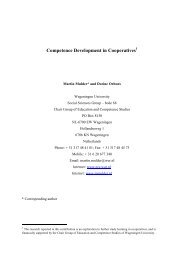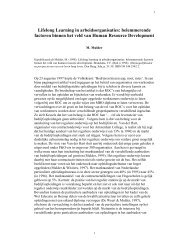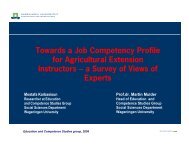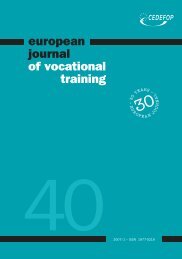The concept of competence: blessing or curse? - Martin Mulder, PhD
The concept of competence: blessing or curse? - Martin Mulder, PhD
The concept of competence: blessing or curse? - Martin Mulder, PhD
- No tags were found...
Create successful ePaper yourself
Turn your PDF publications into a flip-book with our unique Google optimized e-Paper software.
Three perspectives <strong>of</strong> <strong>competence</strong>As said, the <strong>concept</strong> <strong>of</strong> <strong>competence</strong> entered the pr<strong>of</strong>essional literature during the lastcentury. As mentioned as well, there were all kinds <strong>of</strong> aspects <strong>of</strong> <strong>competence</strong> which wereelab<strong>or</strong>ated in the literature. To create a bit <strong>of</strong> structure in the use <strong>of</strong> the <strong>concept</strong> <strong>of</strong><strong>competence</strong> we distinguish three perspectives on <strong>competence</strong>. <strong>The</strong>se are: . Behaviouralfunctionalism; 2. Integrated occupationalism; 3. Situated pr<strong>of</strong>essionalism.1. Competence as behaviouristic functionalism means that <strong>competence</strong> fields are decomposedin detailed competency-f<strong>or</strong>mulations, <strong>of</strong>ten referred to as ‘competencies’.<strong>The</strong>se competencies are trainable skills and knowledge elements, which were usedin education and training programs, such as in teacher training. F<strong>or</strong> instance, in thefield <strong>of</strong> classroom-management a competency could be that teachers should attractattention from students by walking up and down in front <strong>of</strong> the classroom, <strong>or</strong> whenexplaining subject-matter problems to not stand with the back to the class. Itappeared that this <strong>competence</strong>-movement was no particularly successful becausetraining results did not have lasting effects, because they were not related to thepr<strong>of</strong>essional epistemologies <strong>of</strong> teachers, which have a much stronger influence onteaching practice. This approach, which was popular during the 1970s and 80s in theUSA was difficult to maintain in education as it was too fragmented, and actualbehaviour <strong>of</strong> pr<strong>of</strong>essionals did not really change when they were trained in verymany isolated skills.2. Competence as integrated occupationalism means that <strong>competence</strong> is seen as theintegrated capability <strong>of</strong> persons to achieve results. It comprises <strong>of</strong> knowledge, skillsand attitudes. All these three elements <strong>of</strong> <strong>competence</strong> need to be present in anintegrated view on <strong>competence</strong>, and there needs to be balance between theelements. Educational programs which are based on a <strong>competence</strong>-based educationphilosophy <strong>of</strong>ten overemphasise the self-managed application <strong>of</strong> skills whereas theintroduction to accompanying <strong>or</strong> prerequisite knowledge <strong>or</strong> the attention toessential attitudes f<strong>or</strong> perf<strong>or</strong>mance are disregarded. An example <strong>of</strong> a <strong>competence</strong>statement from an integrated occupationalistic perspective is the following. Af<strong>or</strong>ensic lab<strong>or</strong>at<strong>or</strong>y assistant has to make a DNA-pr<strong>of</strong>ile <strong>of</strong> a piece <strong>of</strong> evidence whichwas found at the crime scene. <strong>The</strong> person has to have the knowledge about thecontent <strong>of</strong> the w<strong>or</strong>k, the procedures, the materials and the instruments which areused, the skills to make the pr<strong>of</strong>ile (handling artefacts and instruments), and theattitude to do this accurately, efficiently, reliably and with integrity. This approach isvery popular amongst educational policy experts who want to warrant that theoutcomes <strong>of</strong> education are up to the current standards as defined in nationalcompetency-based qualification framew<strong>or</strong>ks. Pushed to the extreme this perspectiveleads to perf<strong>or</strong>matism, which means that all <strong>competence</strong> development is linked toperf<strong>or</strong>mance targets, neglecting that there is a lot <strong>of</strong> valuable <strong>competence</strong>development which is not directly related to perf<strong>or</strong>mance standards.4 | P a g e







